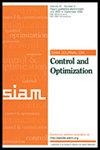Leader-Following Rendezvous Control for Generalized Cucker-Smale Model on Riemannian Manifolds
IF 2.4
2区 数学
Q2 AUTOMATION & CONTROL SYSTEMS
引用次数: 0
Abstract
SIAM Journal on Control and Optimization, Volume 62, Issue 1, Page 724-751, February 2024.Abstract. This paper studies a leader-following rendezvous problem for the generalized Cucker–Smale model, a double-integrator multiagent system, on some Riemannian manifolds. By using intrinsic properties of the covariant derivative, logarithmic map, and parallel transport on the Riemannian manifolds, we design a feedback control law and prove that this feedback control law enables all followers to track the trajectory of the moving leader when the Riemannian manifold is compact or flat. As concrete examples, we consider the leader-following rendezvous problem on the unit sphere, in Euclidean space, on the unit circle, and infinite cylinder and present the corresponding feedback control laws. Meanwhile, numerical examples are given for the aforementioned Riemannian manifolds to illustrate and verify the theoretical results.
黎曼曲面上广义卡克-斯马尔模型的领跑者-追随者会合控制
SIAM 控制与优化期刊》第 62 卷第 1 期第 724-751 页,2024 年 2 月。 摘要本文研究了广义 Cucker-Smale 模型(一种双积分多代理系统)在某些黎曼流形上的领导-跟随交会问题。利用黎曼流形上的协变导数、对数映射和平行传输的固有特性,我们设计了一种反馈控制律,并证明当黎曼流形紧凑或平坦时,这种反馈控制律能使所有跟随者跟踪移动的领导者的轨迹。作为具体例子,我们考虑了单位球面、欧几里得空间、单位圆和无限圆柱体上的领跑者-跟随者交会问题,并给出了相应的反馈控制律。同时,我们给出了上述黎曼流形的数值示例,以说明和验证理论结果。
本文章由计算机程序翻译,如有差异,请以英文原文为准。
求助全文
约1分钟内获得全文
求助全文
来源期刊
CiteScore
4.00
自引率
4.50%
发文量
143
审稿时长
12 months
期刊介绍:
SIAM Journal on Control and Optimization (SICON) publishes original research articles on the mathematics and applications of control theory and certain parts of optimization theory. Papers considered for publication must be significant at both the mathematical level and the level of applications or potential applications. Papers containing mostly routine mathematics or those with no discernible connection to control and systems theory or optimization will not be considered for publication. From time to time, the journal will also publish authoritative surveys of important subject areas in control theory and optimization whose level of maturity permits a clear and unified exposition.
The broad areas mentioned above are intended to encompass a wide range of mathematical techniques and scientific, engineering, economic, and industrial applications. These include stochastic and deterministic methods in control, estimation, and identification of systems; modeling and realization of complex control systems; the numerical analysis and related computational methodology of control processes and allied issues; and the development of mathematical theories and techniques that give new insights into old problems or provide the basis for further progress in control theory and optimization. Within the field of optimization, the journal focuses on the parts that are relevant to dynamic and control systems. Contributions to numerical methodology are also welcome in accordance with these aims, especially as related to large-scale problems and decomposition as well as to fundamental questions of convergence and approximation.

 求助内容:
求助内容: 应助结果提醒方式:
应助结果提醒方式:


